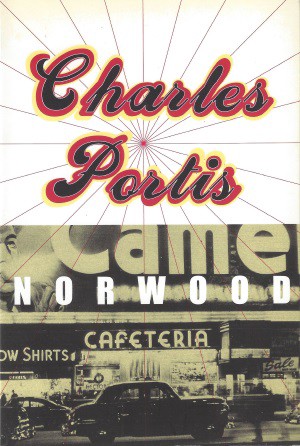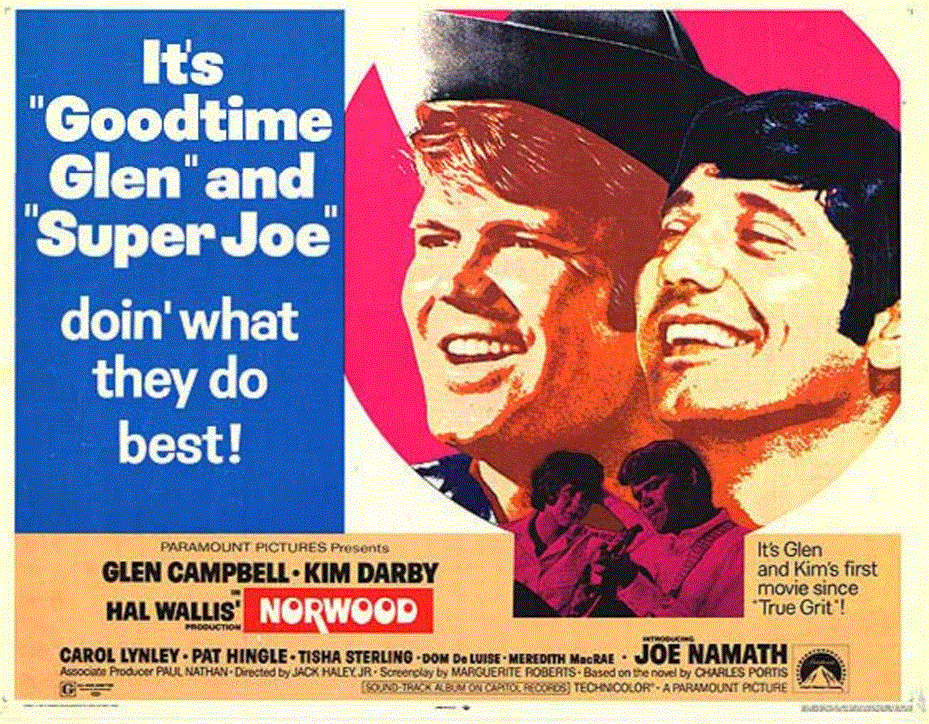Appreciating Charles Portis
by Kyle Brazzel

A novelist can withstand only so many pieces about how he’s America’s most underappreciated writer until he becomes appreciated exactly enough. So, on the fiftieth anniversary of the publication of Norwood
, his first novel, let us now further appreciate America’s appreciated-exactly-enough novelist, Charles Portis.
Back when the appreciation was insufficient, Donna Tartt and Wells Tower were especially effective in tipping the scales, and Ron Rosenbaum’s cheerleading campaign in Esquire and The New York Observer had a huge impact in getting Portis’s novels back into print. Tom Wolfe expended a fair amount of words in “The Birth of ‘The New Journalism’” about Portis and his uncanny transition from newspapering to novel-writing, and that was back in 1972. Wolfe sat with Jimmy Breslin and Portis at The New York Herald Tribune, a paper, Wolfe recalled, that “was like the main Tijuana bullring for feature writers.” He watched Portis charge right out to become bureau chief in London, a move that reportedly put an end to a romance he had going with Nora Ephron (who would later compare him to Gabriel García Márquez.) Once Portis got to London, he met the Queen with a bright red cigarette burn on the end of his nose, the previous evening’s drinking bet gone wrong. The Queen probably did underappreciate him.
After a year of reporting stories on telephones he suspected were wiretapped, so frequently did the lines click and break, Portis returned to his native Arkansas, where he still lives, and found a typewriter and a remote cabin in the Ozarks. Here’s Wolfe, appreciatively agog:
In six months he wrote a beautiful little novel called Norwood. Then he wrote True Grit, which was a best seller. The reviews were terrific … He sold books to the movies … He made a fortune … A fishing shack! In Arkansas! It was too goddamned perfect to be true, and yet there it was. Which is to say that the old dream, The Novel, has never died.
Norwood is indeed a beautiful little novel. At 190 pages, it’s Portis’s slightest. It’s curious how much attention “The Birth of ‘The New Journalism’” pays Portis’s oeuvre, considering how little the novels (two at the time) follow the tenets of experimental forms or examine the subversive. Between the releases of the book and film versions of Norwood, Midnight Cowboy reset expectations for the rube-goes-to-New-York story, but the kinkiest thing Portis’s title character encounters on his pilgrimage from small-town Texas is a hot dog on a bed of baked beans, purchased at an Automat. If Portis was slouching into anything it was back into the utterly familiar, conjuring the fictional Ralph, Texas, a town of shade-tree mechanics and tented roller rinks, not far removed from the south Arkansas towns where he grew up, near the Louisiana border.

But Norwood is hardly autobiographical, letting alone that, like his creator, Norwood Pratt served in Korea. The experience doesn’t broaden Pratt’s world in the least, but it consolidates his ambition to get booked to sing on “Louisiana Hayride,” a sort of second string to Nashville’s Grand Old Opry. Portis knew well the ways a twangy country song could play on a serviceman’s self-pity. “There were few rifle companies in that war without a wind-up record player and a well-worn 78 rpm record of Hank Williams’ ‘Lovesick Blues,’” Portis wrote in a Saturday Evening Post report on Nashville’s country music scene, published in 1966, the same year as Norwood.
By the time Portis sat down to write Norwood, the post-war boom in novels exploring white-male ennui was on the decline. But Portis went off any recognizable narrative grid; his sympathies lay with characters who never considered rebellion. Norwood Pratt begins as a discharged Marine on the way to becoming a mechanic — a rung where, despite his fantasies of country-music stardom, one expects him to stay.
“A lot of his people would now be called slackers, I think,” Calvin Trillin told me of the Portis coterie. “They didn’t want to rise in the firm or anything like that.” (Trillin did detect something aspirational in Mattie Ross, which is why he read True Grit aloud to his daughters.)
“Norwood is simple,” said Roy Blount Jr., another fan. “It doesn’t go out of its way to be funny, or even to be a story. It doesn’t raise any big issues other than the main ones: getting paid, doing right, finding somebody to be with.” Blount’s favorite story of the Portis novel is of how a friend sent his girlfriend upstairs with a copy of Norwood to read before clarifying how he felt about her. When he heard her laughing, he knew they had something.
Call it The Norwood Ultimatum — the challenge to find enduring worth in a volume Wolfe and Blount damn with diminutive praise. This has to do with what we now call “narrative stakes,” a phrase it’s unlikely Portis gave any consideration. Ray Midge sets out to get back his wife and his prized Ford Torino, not necessarily in that order. Mattie Ross sets out to avenge her father — a mission that is simply only in that it is primal: blood simple, to put it in terms the Coen Brothers, responsible for the superior of True Grit’s two film adaptations, could appreciate.

When he started publishing novels, Portis had traveled the world and become a star at the Tribune, for which he continued an area of coverage he began at Harry Ashmore’s Pulitzer-winning Arkansas Gazette: the country’s ongoing civil-rights struggle. Wolfe was especially tickled by the story of a press conference during which Portis repeatedly addressed Malcolm X as “Mr. X.” In Portis’s telling, use of the honorific was attributed to his own Southern sense of decorum. In Wolfe’s, it was insouciance: Portis reacting to Malcolm X’s insistence that nobody in the room call him merely “Malcolm,” because he “was not a dining-car waiter.”
In his curiosity about the world and his responses to what he saw as its absurdities, Portis shared more with True Grit’s 14-year-old heroine Mattie Ross than he did with Pratt, his debut creation. (By the novel’s end Mattie understands that she is “a woman with brains and frank tongue.”) Ray Midge, the protagonist of The Dog the South, also seems to share more Portis DNA than Norwood. A newspaperman, he becomes so excited reading historical accounts of Hannibal and de Soto he has get up and pace the room to catch his breath. Meanwhile Pratt is positively anti-intellectual; while a bohemian New York paramour reads aloud to him from “something called The Prophet,” he clips his fingernails.
All Pratt seeks is seventy dollars owed to him by a fellow Marine. (No sooner has he gotten it back does he loan fifty of it to a downtrodden former circus performer billed as “the world’s smallest perfect man.”) Indignity upon indignity befalls him, not least of which, it must be noted, was his own movie version, released in 1970. Larry McMurtry’s The Last Picture Show, another novel of small-town Texas life marking its fiftieth anniversary this year, got Peter Bogdanovich in moody black-and-white. Norwood got Jack Haley, Jr., a director best known for show-business documentaries like That’s Entertainment! and being Liza Minnelli’s second husband.

Portis’s singular achievement with Norwood has nothing to do with narrative scope or depth of feeling, but in establishing and sustaining tone in a comedy of manners where no two characters subscribe to the same set of them. This, in particular, seems to have tripped Haley up. (Though casting the country singer Glenn Campbell as Norwood Pratt didn’t help.) In an exchange at a roadside diner, a cheerful waitress asks Campbell, as Pratt, for his order. “A cup of coffee, I guess,” he replies. “I’ll put in my own cream.” Campbell adds this last bit, a throwaway in the scene, with a kind of sheepish pride, like a little boy who’s pushed the elevator button by himself. But here’s how it goes in print: “Norwood snapped at the counter girl for putting cream in his coffee. She said she didn’t know where he was from but if you wanted it black you had to say so. He told her he was from a place where they let you put your own cream in your coffee. From little syrup pitchers with spring lids.” The highly specific irritability Haley scrubbed from Norwood the movie may be another reason its source material can feel underappreciated. But, that’s entertainment.
Ultimately, Portis gave Norwood Pratt one dignity otherwise allowed only to Mattie Ross: a sense of closure from across the ages. Ross delivers her coda (“time just gets away from us”) at the end of True Grit. Norwood’s didn’t arrive until 1996, in a short story Portis produced for The Atlantic. (Titled “I Don’t Talk Service No More,” it’s reprinted in Escape Velocity, an essential anthology for the Portis completist, edited by Jay Jennings
.) Portis doesn’t name the narrator, so it takes a little magical thinking to see him as Norwood Pratt. But not much. He’s a Korean War vet, confined to an institution, determined to relive a definitive raid by breaking into the library each night and telephoning former members of his squad. The library is behind a locked door; the telephone is in a locked drawer. “It’s not so bad if you have the keys,” he tells one of his midnight commiserators. “For a long time I didn’t have the keys.” Fifty years on, Norwood isn’t going to give you any keys, but it does reassure with the sense that everybody fumbles with the locks.
